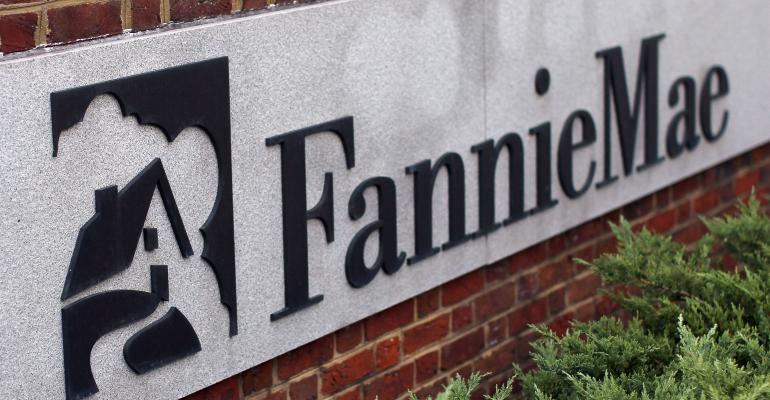Ten years after the federal government seized control of Fannie Mae and Freddie Mac, both Congress and President Donald Trump are calling for change for the two mortgage giants.
"The President is directing relevant agencies to develop a reform plan," said the White House in a March 27 letter that called on legislators to "end the conservatorship of Fannie Mae and Freddie Mac."
Not to be left out of the process, the chairman of the Senate Banking Committee, Sen. Mike Crapo (R-Ind.), released his own outline for reform and privatization.
That’s been nerve-wracking news for the apartment sector. Fannie Mae and Freddie Mac currently provide roughly half of the permanent financing for all apartment properties. It’s not clear how reform would change those programs. Over the last 10 years, the apartment sector has adapted to the odd situation of the two government-sponsored entities (GSEs), which are still nominally owned by shareholders, though they are closely overseen by federal regulators and all their profits flow to the U.S. Treasury.
Apartment trade associations have closely followed discussions in Congress about the form that potential reform might take—if it ever happens. “There seems to be a lot of consensus,” says Ken Fears, senior policy representative on housing finance for the National Association of Realtors, a trade organization based in Washington, D.C.
Why do anything?
In the years immediately following the financial crisis, it seemed obvious to everyone involved that the GSEs would be eventually reformed. But over the last decade, the urgency has drained away.
“The Real Estate Roundtable encourages lawmakers to build upon successful risk-sharing mechanisms by employing the GSE's existing multifamily finance structures, which have been essential in expanding the supply of rural, senior, workforce and affordable rental housing, while minimizing taxpayer exposure,” says Clifton E. (Chip) Rodgers, Jr., senior vice president for the Roundtable, also based in Washington, D.C. “But there is no real pressure from events to take immediate action.”
However, investors who have gradually bought up the shares of Freddie Mac and Fannie Mae, continue to call for the companies to be turned over to them. Also, the current structure of the companies limits the amount of reserves they can keep on hand. If they did ever suffer losses in a downturn that required Congress to act quickly, it’s not certain how lawmakers would respond. “You leave the door open for the knee-jerk response,” says Fears.
To bring significant change to the GSEs, Congress will have to create a plan that both parties can agree on. The Senate’s Banking Committee created a bi-partisan proposal several years ago, but it never got a full vote in the Senate.
Legislators agree on a government guarantee
So far, in the latest round of discussions, lawmakers and administration officials seem to agree that whatever entity or entities fulfill Fannie Mae and Freddie Mac’s role should be able to issue housing bonds with an explicit government guarantee, according to experts like Fears and Rodgers.
That’s a big change from a few years ago, when many called for the government to get out of the business of guaranteeing housing bonds—particularly in the House of Representatives, then under Republican control.
Without any government guarantee, however, it would be impossible to give homeowners 30-year mortgages, according to experts like Fears. “The Presidential memorandum aims to preserve the 30-year fixed-rate mortgage,” according the White House. Also, without a government guarantee, interest rates would be significantly higher both for home mortgages and for permanent loans on apartment buildings. “In a crisis mode, interest rates could be as much as 5 percentage points higher,” says Fears.
Legislators also seem to agree that any reform of Fannie Mae and Freddie Mac should protect taxpayers from large losses. "Housing finance reform must appropriately balance taxpayer protections with the need to establish an efficient marketplace," says Rodgers.
To prevent the government guarantee from being abused, private investors will have to be willing to take the first losses on any bond issuance that would receive the guarantee. Sen. Crapo’s outline for reform of the GSEs would make Fannie Mae and Freddie Mac two private companies among several that are allowed to use an explicit, limited government guarantee to issue housing bonds with oversight from federal officials at the Federal Housing Finance Agency (FHFA).
No guarantor will be able to guarantee more than a fraction of all outstanding guaranteed eligible mortgages, according to Crapo’s outline. They would have to compete fiercely with each other to convince banks to issue housing loans that they could securitize and sell to bond investors. That might encourage efficiency and a broad range of product offerings as the companies fought to differentiate themselves, though apartment industry experts question how much efficiency that competition would create. “If you go from two guarantors to 10, it’s still an oligopoly,” says Fears.
Increasing the number of guarantors to as many as 10 could also create problems. “With multiple guarantors, it is harder for any one to have a national footprint,” says Fears. “Major metro areas and the coasts will be well-served. Smaller and mid-sized towns aren’t going to do very well.”
Also, these private companies are likely to avoid areas that come with challenges, like Houston in the aftermath of recent hurricanes. “You are going to see guarantors migrate away from those areas,” says Fears.
Another vision of reform could turn Freddie Mac and Fannie Mae into private market utilities, according to Fears. “They would not be part of the government, but they would have to allow much more oversite from FHFA [than convention companies],” he says. “It would be very, very close to what we have today.”

